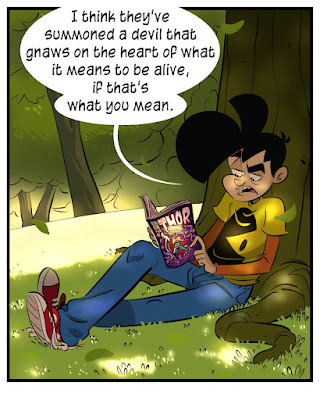.
So how about those AI art programs--Dall-E and the like? Personally, I don't think anybody's said it better than the guys at Penny Arcade, above. (You can find the entire cartoon here.) There's been a lot of argument over whether the astonishingly convincing images created by something that isn't even self-aware are art or not. But nobody doubts that these programs are going to put a lot of illustrators out of work and seriously reduce the incomes of many or most of those who remain.
This prospect horrifies me, particularly since I know and like a like of those artists personally. But it's going to strike a lot closer to home a lot sooner than I thought.
I was talking with an editor at a science fiction convention recently and observed that sooner or later there were going to be programs that wrote fiction.
"Oh, they're already here," he said. In fact, he knew a writer who routinely uses one to create his first drafts. He types in a few prompts and it spits out an entire story which he then revises into something that can be published.
The writer in question produces
formulaic fiction, of course. But the programs are only going to get
better. A lot of marginal writers are likely to be forced out of the
marketplace soon. And after that, better ones. And after that...
In the meantime, editors are consulting with each other on how to develop tools to detect artificially-created fiction. Because the means such programs employ--studying massive amounts of published fiction and writing imitations of it--leaves everyone involved open to charges of plagiarism.
So what can writers do?
Step one is to ditch Joseph Campbell's Hero's Journey. Every time you write a story or book that recapitulates the twelve or seventeen or ninety-eight stages of heroism, you're doing your bit to program the reader to expect exactly that structure. And that structure is extremely easy to imitate. Hell, a machine could do that. If not today, then soon.
Step two is to stop relying on all the other crutches that writers use to come up with an easy story: Retelling a classic story but making the villain the hero, rewriting fairy tales but giving the protagonist contemporary values, etc., etc., etc.
Step three is to dig deep and come up with stories that satisfy the readers without giving them what they're expecting. Human stories that no non-sentient machine could possibly write because they're not retellings of stories that came before.
I know that sounds difficult. It is difficult. But if you decided to become a writer because you thought it would be easy... boy, are you in the wrong place!
End of sermon. Go thou and sin no more.
Above: I'm not a gamer but I follow Penny Arcade (www.penny-arcade.com) to keep up on that portion of the culture that involves gaming--most of it, to be precise. Also, it can be pretty funny. I recommend it.
*




2 comments:
All the arts are in jeopardy, if you come right down to it. As Damien Riehl points out in his TED talk posted back in April, there are only so many permutations of notes, which is already leading to accusations of plagiarism when composers accidentally duplicate phrases from someone else's piece that they've never even heard. Feed those patterns into a composer AI and ... Well, the implications are obvious. Indeed, composer AIs already exist, as I needn't tell you.
Combine that with the sophisticated and convincing way CGI can now mimic living beings, increasingly including humans, and the ultimate scenario starts looming: a world of "alternative art" of the same nature as a certain press secretary's "alternative facts". Right now, the Wall-E type of program is just a tool for the artists who are having fun playing with it. It may well not always be.
Sounds like Fritz Leiber was on to something when he envisioned "wordmills" cranking out fiction in his novel "The Silver Eggheads".
Post a Comment